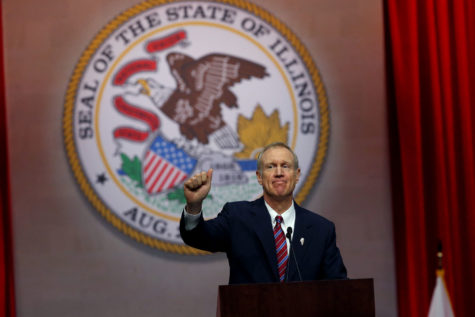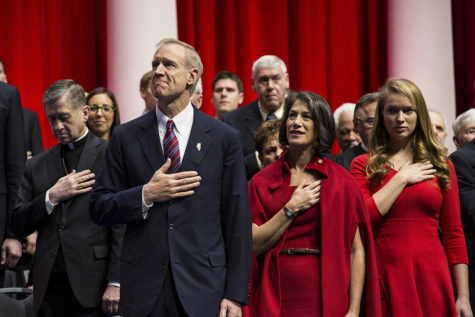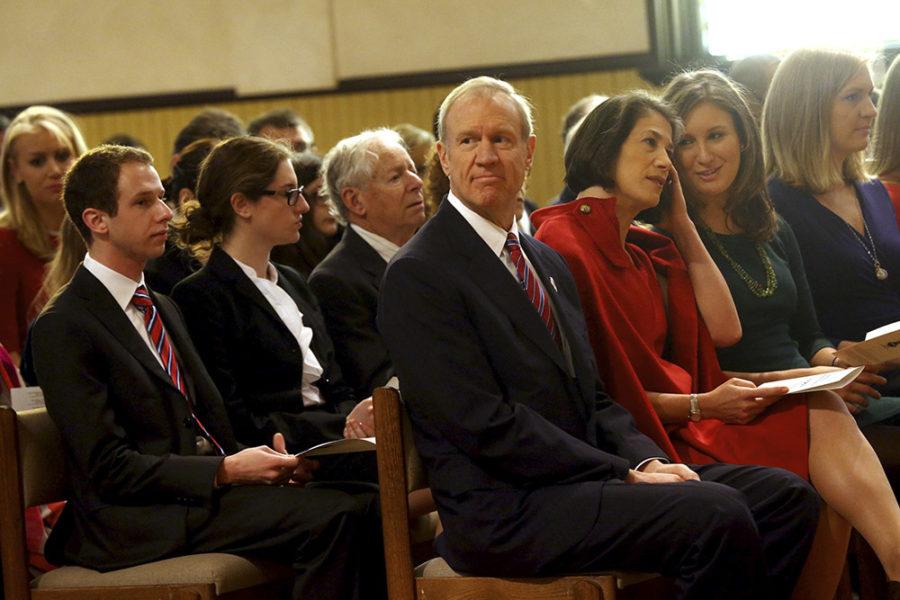Editorial: Lawmakers should override Gov. Bruce Rauner’s veto of motor voter bill
Then-Gov.-elect Bruce Rauner and his wife Diana attend an interfaith prayer service at First Presbyterian Church on Jan. 12, 2015 in Springfield. (Nancy Stone/Chicago Tribune/TNS)
August 17, 2016
On the last day of its spring session, the Illinois General Assembly passed a “motor voter” law that would automatically register people to vote when they get their driver’s licenses.
The vote was overwhelming, 50-7 in the Senate and 86-30 in the House. On Friday, Gov. Bruce Rauner vetoed the bill, saying he’s worried about the potential for voter fraud, as well as possible conflicts with federal law.
We think that was the wrong decision, and we urge the General Assembly to override the veto.
Advertisement
This wouldn’t affect the Nov. 8 election. The law would have taken effect in January 2018, the year Rauner has to run for re-election.
Here’s how the law would work and how it differs from what Illinois has now.
Today, when people get their driver’s licenses, either for the first time or to renew, they are asked whether they’d like to register to vote, or, if their registration has lapsed, if they’d like to re-register.
Under the measure Rauner vetoed, people getting their driver’s licenses would be automatically registered to vote unless they specifically said no.

Also, people interacting with state government departments like Aging, Healthcare and Family Services, and Employment Security would also be registered to vote automatically unless they opted out.
Rauner said federal law requires potential voters to sign an application and affirm that they meet the requirements to vote; the bill he vetoed lacks those provisions. These are minor details that could be corrected easily; the state Board of Elections should be able to determine who might be ineligible.
We think the legislation is valuable; it simplifies government both for the bureaucrats and the public, something Rauner says he wants to do.
Advertisement*
Plus, it encourages more people to vote. Americans have a dismal record when it comes to voter turnout, and everything that can be done to encourage more people to go to the polls should be done.
Unfortunately, most states run by Republican governors have been doing just the opposite by reducing the number of polling places in poor neighborhoods, reducing early voting days and hours, imposing complicated eligibility requirements and doing other things to discourage people from voting.
MORE: Illinois governor makes record bid of $104,000 for steer at state fair
They do this under the guise of preventing voter fraud, although there’s absolutely no evidence of widespread voter fraud in this country.
In Winnebago, Boone and Stephenson counties, the ones with which we’re most familiar, elections have been clean, courteous and fair for as far back as our collective memories go. We are not naive enough to believe that there has been no fraud in the state of Illinois, but the legendary stories of vote stealing are in the past; elections are well-monitored today, even in Chicago.
Some of these states have been so extreme in making it more difficult to vote that federal courts have overturned plans in recent weeks in Texas, North Carolina, Wisconsin, North Dakota and Kansas.
The obvious attempt was to keep people suspected of being Democrats from voting. We shouldn’t have a two-party system in which one party must count on a low voter turnout in order to win, and the other needs a high voter turnout to be successful.

Both parties should tailor their appeals to all voters. Voting is a right, and the U.S. through its 50 states should make registering to vote as easy as possible.
One hopeful sign: The governor says he’s open to approving a modified version of the bill he vetoed, to make sure agencies registering voters verify their citizenship. He also said he wants a longer implementation schedule and funding for the new procedures.
We think January 2018 is plenty of time and don’t see why extra money would be needed to put this law into place. The bureaucrats are already there! For a governor interested in streamlining government, Rauner sure seems to be placing roadblocks where none are needed.
To restate our strongly held opinion: The General Assembly should override his veto; the state should get to work implementing the streamlined “motor voter” law.
MORE: New Illinois law makes changes in investigation and prosecution of rape cases
___
(c) 2016 Rockford Register Star, Ill.
Visit Rockford Register Star, Ill. at www.rrstar.com
Distributed by Tribune Content Agency, LLC.
Advertisement








